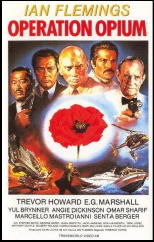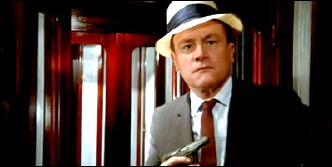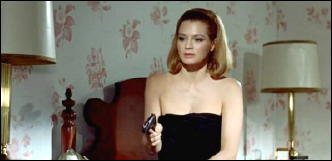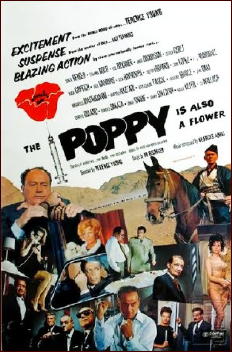Mon 25 Nov 2013
A TV-Movie Reviewed by David Vineyard: THE POPPY IS ALSO A FLOWER (1966).
Posted by Steve under Crime Films , Reviews[11] Comments
THE POPPY IS ALSO A FLOWER (aka The Opium Connection). Made-for-TV movie, ABC, 22 April 1966. Expanded theatrical release, 1967 [?]. Yul Brynner, Stephen Boyd, Angie Dickinson, Rita Hayworth, Trevor Howard, E.G. Marshall, Omar Sharif, Eli Wallach, Jack Hawkins, Gilbert Roland, Hugh Griffith, Marcello Mastroianni, Trini Lopez, Senta Berger, Barry Sullivan, Nadja Tiller, Harold Sakata, Anthony Quayle, George Geret, Howard Vernon. Narrator: Grace Kelly. Screenplay by Jo Eisinger, based on a story by Ian Fleming. Directed by Terence Young.

The amount of tripe written about this big budget made for television film done for the United Nations as an anti-drug project, and originally shown on ABC television in this country is amazing. For some reason it seems to drive some critics and viewers to extremes of near insanity far beyond any problems it has.
In reality it is a fair action adventure film with a point that deals with the efforts of the UN and the then Iranian secret police to deal with the trade in illegal opium.
I say any film that features Gilbert Roland as the villain, Rita Hayworth as a junkie, and E. G. Marshall in hand to hand combat with Harold (Oddjob) Sakata can’t be all bad. That’s not to mention wry Hugh Griffith as a opium selling bandit chief, Eli Wallach as a former Mafioso deported from the US, and Angie Dickinson as a mysterious woman getting ready for a shower with E. G. Marshall hiding under her bed is at least worth watching.
Did I mention the two girls in bikinis wrestling in the nightclub?
In 1966 that wasn’t something you saw often on television.
Trini Lopez even sings “La Bamba” and “Lemon Tree.”
Okay, that may not be entirely in its favor.
When UN agent Benson (Stephen Boyd) buys up the opium crop before drug king Serge Marko’s (Gilbert Roland) people can he promptly gets killed but not before destroying the opium. Now Marko is under pressure to secure the next supply or be out $10 million dollars.
Arriving in Iran to assist in the hunt for the opium connection is UN agent Sam Lincoln (Trevor Howard) and US Treasury Agent Coley Johns (E.G Marshall) No sooner have UN operative Omar Sharif and Iranian soldier Yul Brynner briefed them on their plan to irradiate the opium* so it can be tracked than Angie Dickinson shows up as Benson’s widow. But Benson wasn’t married.
Marshall and Howard make a good team with a nice playful attitude and give and take:

Johns: You’re never there.
Considering everyone was working for nothing the performances are better than they had to be.
It’s not Oscar material, but it is nothing like the nonsense written about it.
The dubbing isn’t too good, but that’s hardly reason to have a hissy fit.
Leonard Maltin rates it a BOMB.
Leonard Maltin gives three stars to Roger Corman’s The Undead.
I’m just saying …
Sam distracts Angie while Coley searches her room which is how he ends up under her bed while she prepares to take a shower.
Mrs. Benson eludes them but they move on to Yul Brynner’s plan to raid the opium supply held by bandit chief Hugh Griffith and irradiate it, leading to a colorful raid on horseback in the mountains. It’s well staged and exciting shot on location among some spectacular scenery.

With the opium irradiated its now up to Lincoln and Johns to follow its trail back to the man behind the distribution, and the trail leads to Naples and deported gangster Happy Lucarno (Eli Wallach) who agrees to help to clear himself of suspicion.
Senta Berger has a nice bit as a drug addicted nightclub performer, and Rita Hayworth one of her last roles as the addicted wife of Marko the drug kingpin. Anthony Quayle is a South African ship’s captain who is a key part of Marko’s smuggling operation.
The plot builds to an exciting showdown with Johns and Mrs. Benson trapped by Marko on the Blue Train out of Marseilles to Lyon as they get the evidence from Mrs. Marko that will destroy him. There is a well staged battle between Marshall and Sakata in the baggage car and an exciting chase through the train yard with a final bitter triumphant line for Johns.
The Poppy Is Also a Flower moves quickly, generates some suspense, features good location work, and unfolds logically to an exciting finale, pausing long enough to develop the characters of the two protagonists and well done vignettes by Brynner, Griffith, Quayle, Mastroianni. Berger, Wallach, and Hayworth. Considering it could have been preachy, stiff, and self important it is not only better than we might expect, but an exciting international chase.
You’ve seen better, but you’ve certainly seen much worse.
I’ve said it before. No film was ever worse for the presence of Gilbert Roland.
But I would like to know what it is about this film that gives some people such an irrational dose of dyspepsia. It’s not dull, it’s not stupid, and it’s not badly written or directed. But it rubs some people the wrong way to a surprising degree.
I can understand not liking it, but the reaction it provokes is all out of proportion to any of its failings.
Maybe that irradiated opium is more dangerous than I realized.
Or maybe the idea of E G. Marshall as James Bond causes some people to froth at the mouth.
* Perhaps the single silliest critique of this one are the countless reviews I’ve read worrying about what would have happened to the poor addicts if they got hold of the irradiated opium. Aside from being so ignorant as to not understand the nature of radiation or that opium is not sold in bulk , but cut and sold as cocaine, heroin, or morphine in doses so small as to make radiation poisoning impossible, the critics seem totally incapable of recognizing this is fiction.
If a drug addict got hold of a kilo of uncut opium chances are he would have died of something else long before radiation poisoning.
When did people get so politically correct they worry about non existent irradiated opium poisoning non existent drug addicts?
No fictional drug addicts were harmed in the making of this picture.

November 25th, 2013 at 2:26 pm
I remember seeing this, but I don’t remember much about it other than thinking that E. G. Marshall was a little old for his role. But what the heck. I was much younger than.
November 25th, 2013 at 7:53 pm
I remember seeing this probably in the 60s but had forgotten about it. I can’t remember if I liked ir or not, but would like to see it again. Thanks for the evenhanded review. The lemon tree song turns up on Sirius from time to time. Unfortunately.
November 26th, 2013 at 7:02 am
I remember seeing it when it first came out and like Bill remember E. G. Marshall as being rather miscast. Otherwise, it was OK – watchable with a good cast.
November 26th, 2013 at 9:15 am
I saw this when it first aired but not since. I remember the incredible amount of hype it got at the time, too. I thought it was okay. Didn’t realize there was such a legion of people who don’t like it.
November 26th, 2013 at 10:34 pm
When this came out Ian Fleming was a major threat to the extreme British left so anything with his name on it was going to be accused of sex, snobbery, and sadism, and a vocal group of the American left marched in cadence with them. This isn’t to suggest the right was any saner, but it was the left that took such a dislike to this.
Today, whatever his flaws, Fleming has been reassessed and accepted in England, and growingly here (it began with Andrew Lycatt’s critically praised biography). But at the time there was great hope that the Bond phenomena and Fleming would just go away. TIME magazine has been predicting the end of the Bond franchise since Goldfinger — they were virtually ecstatic not long ago when it appeared the MGM restructure had done the job.
Today it is hard to imagine Fleming and Bond having that kind of impact, but recall he was the last true voice of the empire at a time that the Labour Party and the extreme left in England wanted to reimagine “Little Britain” as they called it.
Here he was about equally hated by left and right. The left hated Fleming because Bond was a cold warrior and establishment figure and Fleming associated with the Churchill right and middle class Oxbridge social dominance, and the right because they could not stand that a British and not American figure had captured the world’s imagination. How do you think we ended up with those awful Matt Helm films?
November 27th, 2013 at 10:07 am
I thought we ended with the Matt Helm films, and numerous other indulgent, copy cat products, because hungry corporate theatrical lawyers and accountants now dominated the distribution of film in the United States. These are essentially the same, or same types, who grew their hair long and tried making follow ups and imitations of Easy Rider. Right on, absolutely. They are the parents of what exists now.
November 27th, 2013 at 10:09 am
Well, we got the Matt Helm films because there was money to be made…and no one should ever hold up TIME as an organ of the US left (I gather you mean along with US leftists, TIME seemed to hate Bond…Bond was the epitome of the square hipster, only deadlier, and of course the Luce sorts would be offended by his raffish disregard for propriety and the films’ implicit suggestion that not all plutocrats were to be revered). These days, I don’t much like Bond films because most of them aren’t very good, though I can have a nostalgic fondness for the goofiness of a YOU ONLY LIVE TWICE.
November 27th, 2013 at 8:02 pm
No, no, TIME fell in with the right wing haters of Bond in this country who were often advocates of the Helm books because it was near treason to cheer for a British hero.
Of course the loathing on the left and right wasn’t the major reason we got Helm, and a damn silly version at that. As much as anything that was an attempt to cash in on the Bond craze by people who had no idea what made Bond work (no, it wasn’t just sex, toys, and outlandish plots — if that were true the Helm series would have lasted longer).
Frankly it is just as well, because I don’t think a really good Helm film series would have done better. Bond, like Tarzan or Holmes both got a huge boost from film, but they also exist on a different fictional level than Helm — they exist off the page in our imaginations, and Helm never did entertaining as the books were. Few characters do.
November 30th, 2013 at 11:49 am
Thanks for the recommendation. I will be watching this one… BUT
I did see the opening and was amused by the narrators assertion that opium was the source of both heroin and cocaine. Not a promising start for a propaganda film.
AND
Someone must stand up for “The Undead”. I mean being on the same side as Leonard Maltin is a bit uncomfortable, but “The Undead” is a far better film than is often assumed. It’s a madly clever story with the soul of a hypnotically regressed prostitute sent back to the body of an ancestor who was about to be beheaded for witchcraft in the middle ages. The middle ages of the film are a dark, fogbound (stage-built) forest inhabited not only by ordinary mortals but also by genuine witches, imps and even the Devil himself. Extreme low budget does not ruin this film which is not only an excellent fantasy time-travel tale but also one with a sting in its tail.
Any dislike of this movie arises from either people who don’t care for the genre anyway or modern, post MS3K who often mock out of reflex.
November 30th, 2013 at 7:45 pm
When MYSTERY SCIENCE THEATRE 3000 did THE UNDEAD they even had Maltin on defending his three stars. The premise is clever I’ll grant, but th execution left me cold.
Cocaine from poppies — modern science is wonderful.
I should point out POPPIES works mostly as a Euro Spy flick with a spectacular cast, but it’s better than most of that genre.
October 8th, 2023 at 8:28 pm
I’ve always liked this quirky movie. I’d like to find a quality version. What I’ve seen on the web and video is garbage. It’s mind-boggling to see EG Marshall, a life-long sedentary, middle-aged actor, kill Quayle and Sakata and beat up Roland. Director Hamilton restages his From Russia With Love slugfest on a moving train. Eli gets my award for funniest, over the top ex-Mafia hood. Not enough photographic emphasis was given to Angie’s legs, world class in 1965. Hayward’s role was thankless. She deserved better.